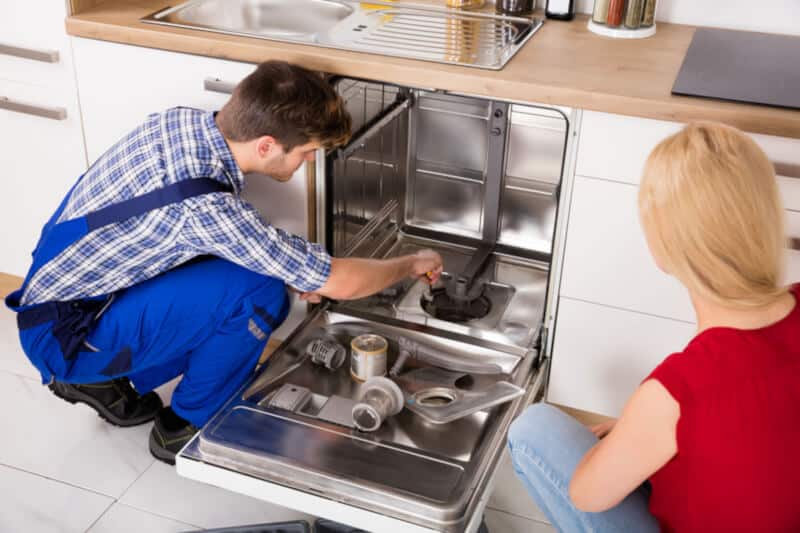
Dishwashers are integral parts of modern life. They make life in the kitchen easy because they save time that you would otherwise spend rinsing the dishes and plates after dinner. However, it also comes with clogging problems that put many off, how to unlog a dishwasher?
Small amounts of water at the bottom of your dishwasher should not bother you. But if you notice that water spills on the floor when you open the door, then you need to act with speed. It’s an indication of clogging within the machine or your drainage system.
Water clogging in the dishwasher will not only render the machine unusable but also causes odor. So, we have prepared this post to walk you through the steps of unclogging your dishwasher.
How Do You Know That Your Dishwasher is Clogged?
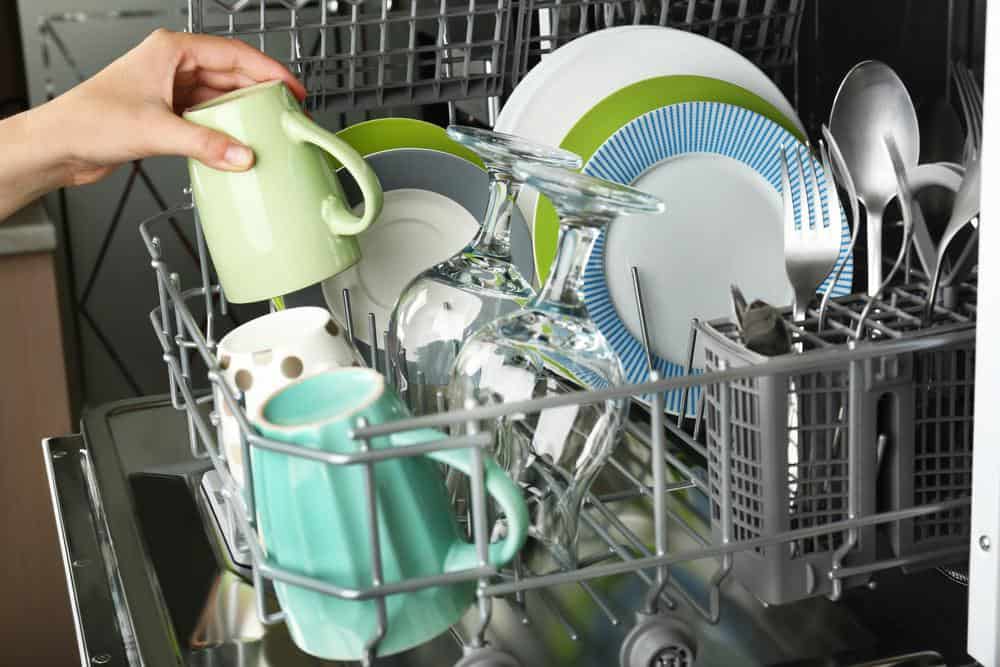
There are many dishwasher problems, but the most common is clogging. Many people identify it by pools of water at the bottom of the machine, but that’s not the only cause. Watch out for the following signs:
Unusual Gurgling Sound
Your dishwasher should run as usual if there are no blockages. It’s the sound that you are used to. However, you can sometimes hear a gurgling sound, or sometimes the machine shakes when operating. It simply means that water from the pump is forcing its way through a clogged drainage pipe.
Water Backing Up in your Sink
Drainage pipes from a dishwasher and sink are connected in many homes. If you see that when your machine runs, water boils up in the sink, it indicates a blockage. While the clogs may not necessarily be in the dishwasher itself, the problem should be fixed. It can be a sign of an issue in the drainage system.
Slow Draining
There is that rate of water drainage from the dishwasher you are used to. If you realize that water stays in the machine for long, the drainage hose is jammed. Or there is a defective component that needs replacement.
Pool of Water in the Dishwasher After the Cycle
This is the sign that will be recognized by many people. We have stated that small amounts of water at the bottom are not problematic. But if it spills on the floor, your machine is clogged and should be cleaned.
Food Bits Stuck in the Filter
A properly functioning dishwasher always remains clean after a wash cycle. If you notice any food debris or other particles on the filter or the main chamber, that’s a sign of a clogged machine.
Dishwasher Keeps Turning Off Before the Cycle Ends
A dishwasher should run smoothly, and all the water pumped out of the machine. If there is a blockage, the pump will be overworked and stall. Consequently, it shuts off before the end of the cycle.
What Causes Clogging in the Dishwasher?
Your dishwasher can clog due to many reasons. Sometimes the problem is caused by something beyond the blocked drainage pipes. The following are some of the causes of dishwasher clogging:
Clogged Filter Basket
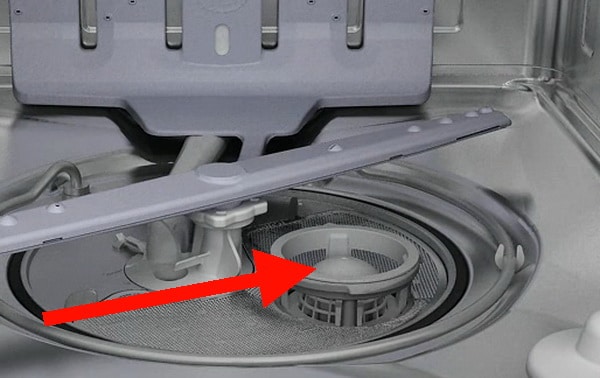
Dishwashers are equipped with filter baskets that stop food particles from passing down to the drain pipes. The filters need regular cleaning to avoid blockage. If you fail to do that, food particles will accumulate on it to block it.
Cleaning your dishwasher’s filter baskets is the best thing you can do. Vinegar is known to unblock filter holes. So, you can try that out.
Faulty Dishwasher Motor
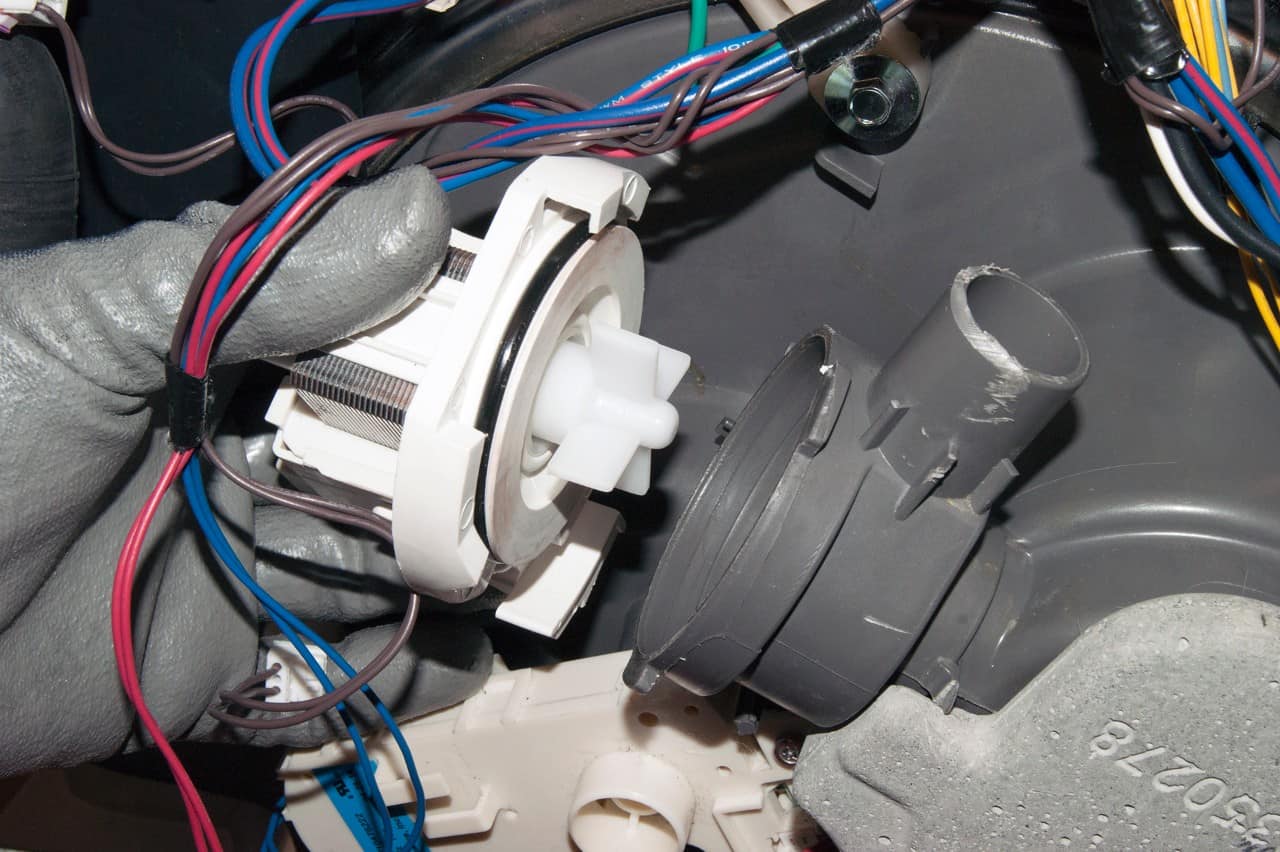
Dishwashers have motors in them that pump out water. There is no alternative if it fails. You may need to replace it. Also, check the belts. Sometimes it’s the worn-out belt that cannot transfer power from the motor to drive water out.
Faulty Drain Valve and Timer
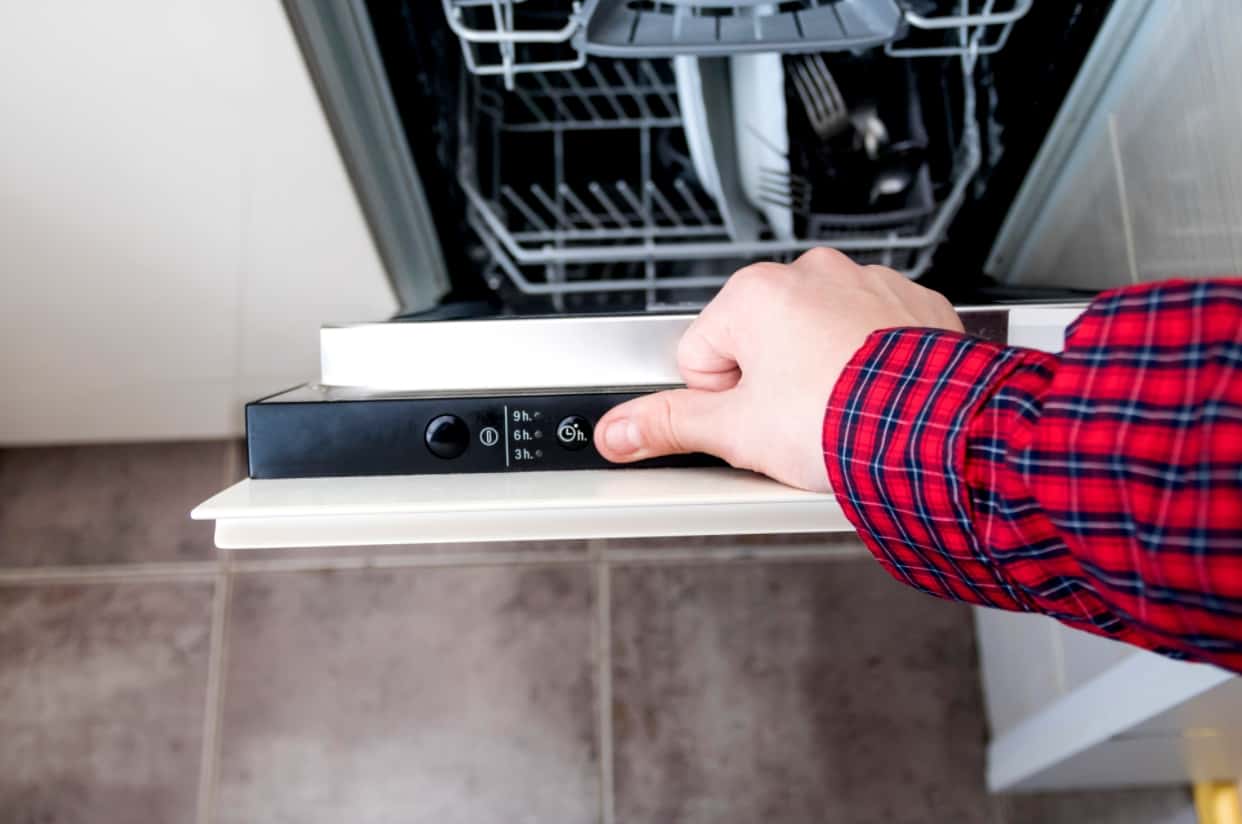
Some dishwashers have a valve and solenoid pair to open and close the water passage. This system is controlled by a timer. If any is faulty, the valve may stick in a closed position, causing clogging. You may need to troubleshoot the problem and repair or replace any component that doesn’t function properly.
Clogged Drain Hose
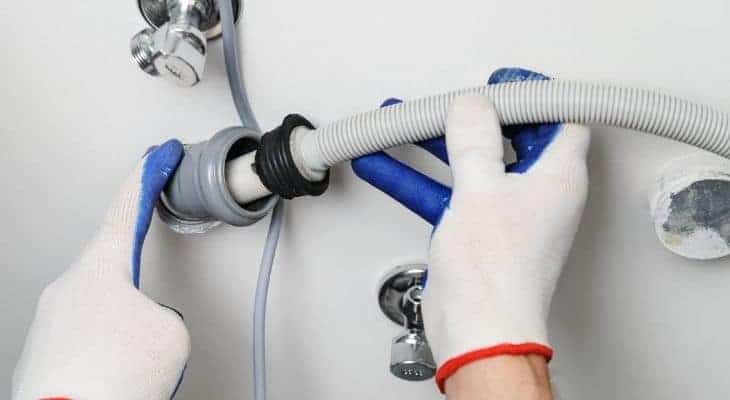
This is the hose that comes from your dishwasher to the main drainage line in your kitchen. It’s usually connected to the one coming from the sink. This drainage pipe can get clogged due to sludge accumulation over time. If it’s blocked, your machine will not have any other route to channel the wastewater.
New Garbage Disposal Installation
Many homeowners have reported their dishwasher being blocked after the installation of new garbage disposal. That usually happens when the knockout plug is in place. So, removing it may resolve the problem.
Clogged Drain
Your home drainage system consists of a network of channels that join together into one drainage line. A clogged drain can cause more problems than just in your dishwasher. Your bathroom, toilet, and sink may also stop draining water. That’s the same thing that happens when you have a broken sewer line in your home.
How Do You Unclog Your Dishwasher?
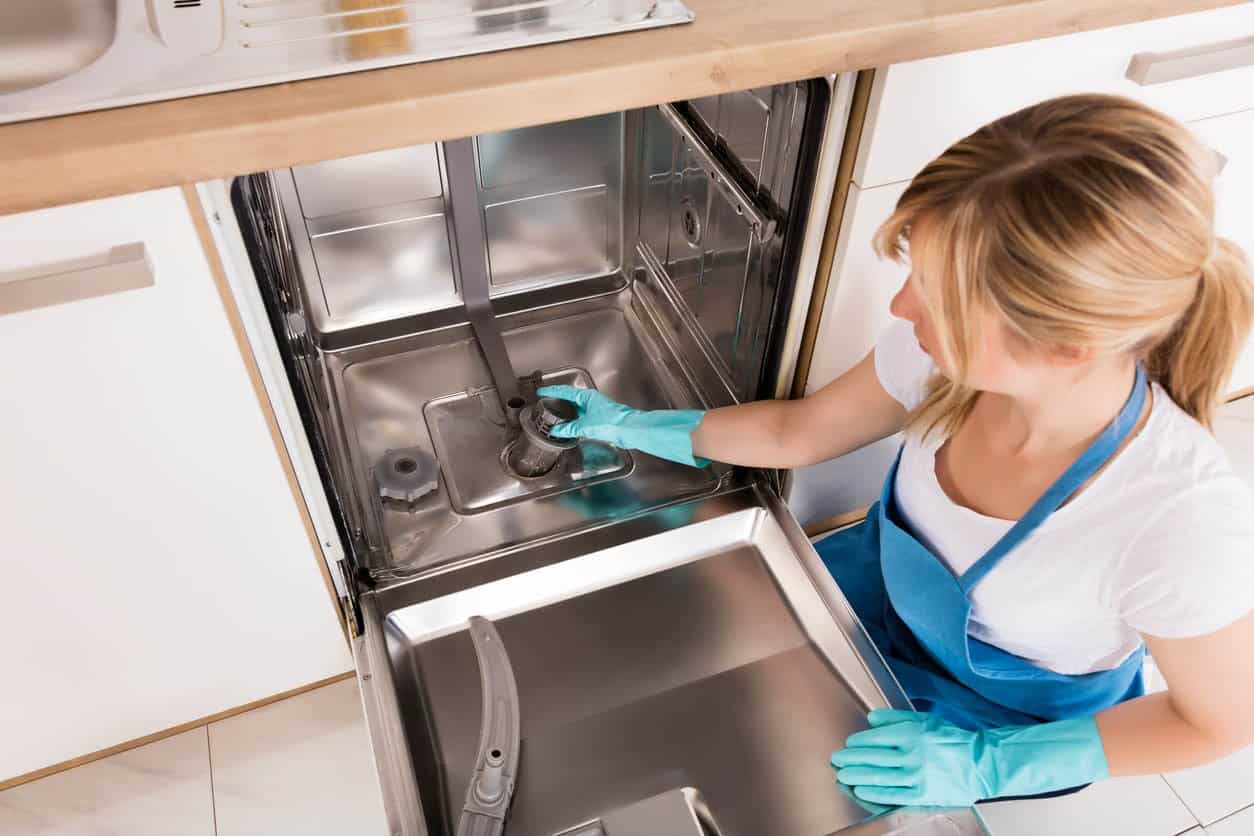
Dishwasher clogging can be caused by a series of problems. So, you should diagnose the root of the problem before embarking on the repair. That’s the first step to take, and you don’t need to open up everything else if functioning normally. Proceed as follows:
Step 1: Check the Filter Basket
Find an empty bucket and wear your hand gloves before starting this task. It’s to protect your hand from dirty water in the dishwasher and detergents used.
Use a cup to scoop out water from the dishwasher and pour it into the empty bucket. Alternatively, you can use a sponge to soak the water and squeeze it into the bucket. Choose an appropriate method to remove all water from your machine.
Remove the filter bucket from the dishwasher and clean it. That involves removing all trapped food debris and rinsing it clean before returning it into the machine. Use soapy water or a vinegar solution to scrub the filter basket.
Step 2: Check Garbage Disposal
The clog may be caused by a blocked drain hose and not the filter. After cleaning your filter basket, proceed to check the garbage disposal. You will need channel lock pliers for this step.
Check the garbage disposal to ensure that it’s not the cause of dishwasher clogging. If it is a casualty, proceed to clean it. But if it’s not the reason, check the connection points for possible blocking.
Spread a towel below the drain hose and use your channel pliers to take it off from the line. Clear any blockage at the connection point. But if there is none, use a dishwasher cleaner or a straight, sturdy wire to clean the drain. Insert it through the pipe to push away any solid particles that block it.
Since you already know that the filter and drain hose are not the cause, you can connect them back and test if water drains.
Some systems don’t have drainage disposals. If yours is similar, check the drain pipe that connects your machine to other plumbing lines.
Step 3: Check the Drain
A problem of blocked drainage pipes will also be associated with other issues. Don’t attempt this step if you are not up to the task. Instead, call professionals to help you out.
Remove a filter basket from the dishwasher and use a drain cleaning tool to dig around the drain opening. You can also use drain augers or de-clogging flush to clear debris within the pipe. We have seen some people using their garden hose to flush the dishwasher drain.
Step 4: Contact a Professional
This is the last step when all the attempts fail. It may be caused by the blockage of the plumbing system. Ensure that your sink, toilet, or bathroom don’t drain before calling a plumber. If they drain well, the problem may be in the mechanical and electrical components of the machine.
As mentioned, a faulty motor, timer, solenoid, belt, and valve can also cause clogging. So, call an expert to examine it and recommend the next course of action.
Can baking Soda and Vinegar Unclog a Dishwasher?
Yes. The fizzling property of this substance is not only for cleaning the toilet but also for removing mild clogs down the drain. It will work in less severe clogging problems.
Start by pouring hot water into the drain and allow it to all sip down. Follow it with half a cup of baking soda, after which you pour a mixture of one cup of white vinegar and one cup of hot water. Let it sit for at least 30 minutes and see if it clears the drain. You can give it as much time as possible for better results.
Can Coke Unclog a Drain?
Yes. The acidic property of the coke drink can help remove mild clogs down the drain. Buy a 2-liter coke drink at room temperature and pour it down the drain. Let it stand for 1-2 hours before following it with hot water. Test your dishwasher afterward to check if it drains properly.
How Can I Unclog My Dishwasher with Washing Soda?
If vinegar, baking soda, and coke drink don’t work, try washing soda. Washing soda, which is sodium carbonate, is a very effective cleaning product that can unclog drains.
Pour one mug of hot water down the drain and follow it with one cup of washing soda. Pour another cup of hot water down the drain and let it stay undisturbed for at least 5 minutes. You may need to repeat this process to fully unclog it.
Conclusion
Don’t allow a clogged dishwasher to mess your kitchen. The odor from the water can be unpleasant, and the fact that you will not use the machine can be annoying. Use the steps and tips highlighted in this article to unclog your dishwasher and bring it back online again. Don’t hesitate to call an expert if all the tricks fail.
